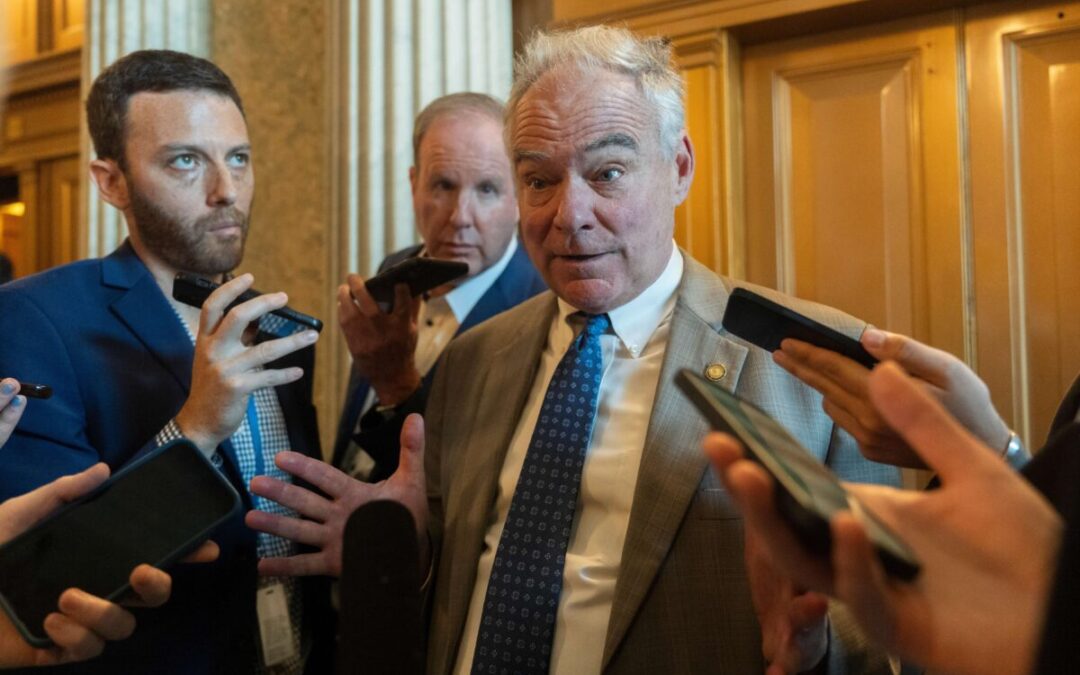
President Joe Biden speaks about his 2024 proposed budget at the Finishing Trades Institute, Thursday, March 9, 2023, in Philadelphia. (AP Photo/Matt Rourke)
President Joe Biden on Thursday released his budget plan, which would raise taxes on the very rich and corporations in order to strengthen Medicare, invest in education and childcare, and lower drug prices—all while cutting $3 trillion from the federal deficit over the next decade.
“When I grew up, trickle-down didn’t work for my family. I ran for president to rebuild the backbone of the country—the middle class,” Biden said. “That’s what my budget is an investment in.”
Specifically, the president’s budget focuses on increasing funding for early childhood education and child care, as well as expanding free community college. His budget also includes tax credits and financial support aimed at middle- and working-class Americans, such as implementing a national paid leave program and reviving the expanded child tax credit that was only approved for one year as part of Biden’s 2021 American Rescue Plan.
It also calls for expanding the existing $35 monthly cap on insulin—which currently only applies to seniors on Medicare—to all Americans. The budget also calls for a boost in military spending to more than $835 billion, making it one of the largest proposed peacetime expenditures in U.S. history.
To fund these measures, Biden calls for a 25% minimum tax on billionaires and for ending federal subsidies for oil and gas companies. These companies earned record profits in 2022 while “undertaking record stock buybacks that benefited executives and wealthy shareholders,” the White House argues. Ending the federal subsidies would save $31 billion, thus lowering the deficit.
Biden’s budget also proposes pushing the corporate tax rate from 21% to 28%, and increasing the Medicare tax rate on Americans earning above $400,000 from 3.8% to 5%.The White House estimates this increase would help keep Medicare’s funds solvent into the 2050s.
His budget also aims to restore the top marginal tax rate to 39.6% for individuals earning more than $400,000 per year and would raise the capital gains tax rate to 39.6% for those earning more than $1 million. Biden has also proposed quadrupling the 1% tax on stock buybacks that took effect in January. The White House claims this would encourage companies to invest in their growth instead of boosting shareholders.
His plan also includes a measure that would give his administration the authority to negotiate the prices of more prescription drugs under Medicare.
Biden’s budget would also save an additional $19 billion by closing the “like-kind exchange” loophole, a special tax subsidy for real estate. This loophole currently allows real estate investors to put off paying tax on profits from deals as long as they keep investing in real estate.
White House Office of Management and Budget Director Shalanda Young told reporters that the Biden administration is able to cut deficit spending “by asking the wealthy and big corporations to begin to pay their fair share and by cutting wasteful spending on big pharma, big oil, and other special interests.”
The Republican-controlled House immediately rejected Biden’s budget, but his proposal does give Americans a peek into what Biden’s platform may be for a potential second term. Although he hasn’t officially announced his campaign, the president is expected to run for re-election in 2024.
Over the past several weeks, President Biden has urged Republicans to release their own budget, which they’ve yet to do. House Republicans have made it clear, however, that they want to apply deep spending cuts to everything from health insurance to food assistance benefits, an effort that would plunge millions more Americans into extreme poverty and make healthcare more expensive.
House Republicans have also introduced legislation that would repeal President Biden’s Inflation Reduction Act, a move that would raise seniors’ prescription drug prices and raise taxes on an estimated 14.5 million people—all while increasing the deficit.
House Republicans claim their efforts to cut spending will reduce the national deficit, but they recently voted to add to the deficit by passing a bill that would strip roughly $71 billion from the Internal Revenue Service—funds which are meant to help the agency pursue wealthy tax cheats. That bill, however, died in the Democratic-controlled Senate.
“The Biden budget plan protects Social Security, strengthens Medicare, and invests in our children,” House Minority Leader Hakeem Jeffries said on Twitter. “House Republicans continue to hide their extreme plans from the American people.”
Biden’s budget proposal comes as he and Republicans must also reach a deal on the debt ceiling in the coming months.
The White House has continued to stand firm on not negotiating over the debt limit, while House Republicans have attempted to tie the debt ceiling to future spending, saying they will not lift it without promises to cut expenses. Those cuts, however, would almost certainly come from programs millions of working-class Americans rely on, like Medicaid, the Affordable Care Act, and food assistance benefits.

Commentary: A blow to Trumpism as Democrats soar in Virginia
Democrats in Virginia and elsewhere won with the message they would fight back against the excesses of the Trump administration and make voters’...

Obama rallies with Spanberger in Norfolk
The campaign for Abigail Spanberger said 7,000 people attended a rally where Democrats criticized Republicans for worsening inequality and eroding...

Virginia Dems rush to support federal workers during government shutdown
Virginia’s economy was already under pressure from the Trump administration’s cuts to federal funding and a sluggish labor market. The uncertainty...

‘Sick to my stomach’: Trump distorts facts on autism, tylenol, and vaccines, scientists say
By Amy Maxmen Originally published September 22, 2025 Ann Bauer, a researcher who studies Tylenol and autism, felt queasy with anxiety in the weeks...

Conservative activist Charlie Kirk dies after being shot at Utah college event
OREM, Utah (AP) — Charlie Kirk, a conservative activist and close ally of President Donald Trump, was shot and killed Wednesday at a Utah college...

‘Everybody’s getting something, except us’: VA debate over AI heats up in the Commonwealth
With more than 675,000 veterans in Virginia, lawmakers face pressure to show that new technology can solve the VA’s chronic delays—without...




